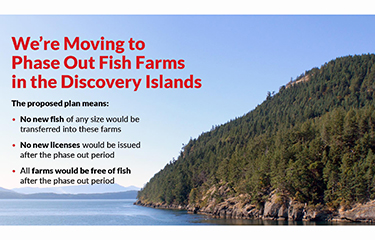Salmon farmers in the Discovery Islands – located in British Columbia, Canada – are asking for more time in a planned phase-out of all net-pen farming in the area in order to alleviate some of the economic impacts.
Fisheries and Oceans Canada announced on 17 December, 2020, it plans to completely phase out all net-pen salmon farming in the Discovery Islands over the next 18 months. Salmon farmers and the B.C. communities – which say they were blindsided by the decision – are asking for an extension to give them more time to prepare for the shift and to avoid the euthanization of salmon.
According to a report prepared for the B.C. Salmon Farmers Association (BCSFA) by RIAS Inc., in order to meet the 18-month deadline, salmon will need to be euthanized at farms in the area.
“Unless an extension to the 18-month deadline is granted, 10.7 million fish will have to be euthanized, and this process will begin taking place in mid-February 2021,” the report states.
The report indicates that the five-year planning and production cycle for salmon means that an 18-month phase-out will result directly in the culling of fish currently in the egg and smolt stages that were destined for Discovery Islands farms.
That euthanization, the report states, will cost salmon companies CAD 105.8 million (USD 83.8 million, EUR 69.4 million) in lost profits, with total losses overall sitting at CAD 170 million (USD 134.8 million, EUR 111 million).
In addition, shortly after the decision, salmon-farming firms operating in the region put capital investment plans on hold, and commercial agreements in the Discovery Islands were terminated.
It isn’t just the salmon farmers directly that will lose money, according to the report. Knock-on impacts of the closures of the farms will impact the entire region, with thousands of jobs lost. Overall, the closure is estimated to reduce the economic output of the entire province by CAD 390 million (USD 309 million, EUR 255 million), “mainly in remote coastal communities of B.C. where there are very few alternative employment opportunities or income sources for families.”
“The estimates … could considerably understate the ultimate economic losses in B.C. resulting from closure of salmon farms in the Discovery Islands,” the report states.
The impact could be greater if other companies that rely partially on salmon-farming companies are affected enough to also be unable to function. The report mentioned that some processing, equipment supply, and fish-net supply businesses have “expressed concern that the impact of this decision is significant enough it could make them economically unviable,” according to the report.
“Reading this report when it arrived was heart-wrenching,” BCSFA Executive Director John Paul Fraser said in a release. “We have been speaking about the impacts of this rushed, ill-considered decision since the day it was made, but this report really captured just how widespread the human and animal welfare impacts will be. Thankfully, we are also able to offer a reasonable, respectful way forward, one consistent with genuine reconciliation with First Nations and real engagement with all parties. The ball is now in the government’s court, and we ask them to seriously, and urgently, consider this reasonable way forward.”
The report on the heavy impacts of the phase out comes as the government of Canada is asking for input on the plan from the public. Canada Parliamentary Secretary Terry Beech plans to hold virtual roundtable sessions with impacted parties throughout March, The Northern View reported.
“As a British Columbian, I know how important the aquaculture sector is to our economy, our workforce, and the sustainability of coastal communities in our province,” Beech said, according to the paper. “The transition from open net-pens will make this vital industry more sustainable and more prosperous in the long-term. I look forward to collaborating with Indigenous communities, the government of British Columbia, industry members, scientists, and other partners to determine the best path forward on a transition plan that meets the needs of our communities, our workers, and our environment.”
For the industry, a better transition would involve a longer-term phase out. The report said a 54-month timeframe would be sufficient time to “forestall the impending devastation for salmon farming companies,” and reduce losses from fish destruction.
“While this doesn’t change the ultimate outcome within the Discovery Islands, it helps make the situation more manageable, and mitigates some of the short-term damages,” the report states.
Image courtesy of Fisheries and Oceans Canada/Bernadette Jordan







